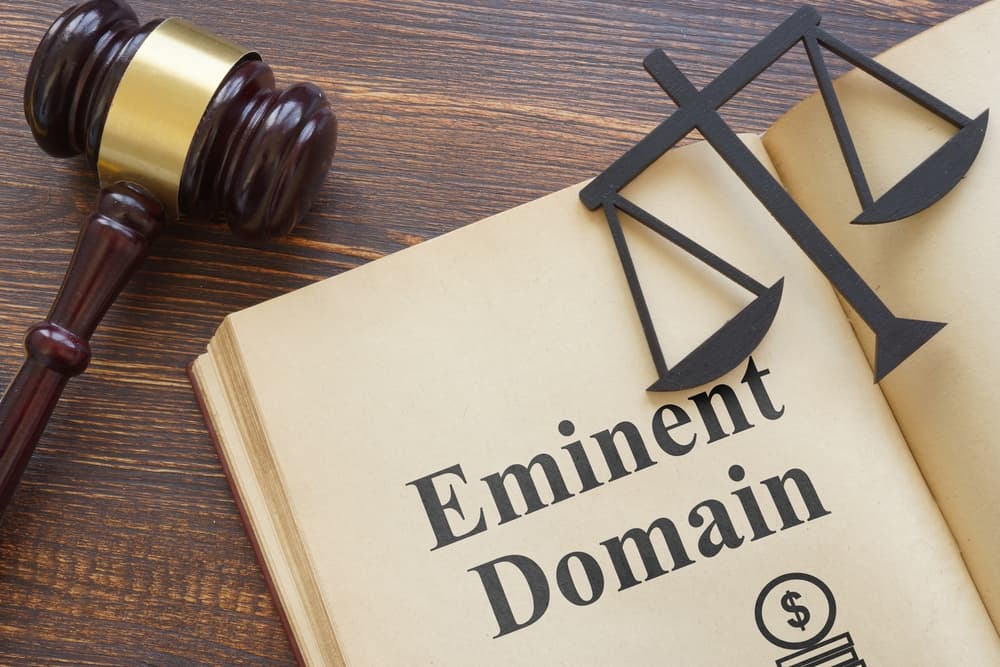Eminent Domain, Land Use, and Zoning Laws

Eminent domain, land use, and zoning laws are important considerations for property owners and developers. Understanding how these laws impact property rights and development plans is crucial when dealing with real estate disputes.
The government has many powers that regulate how you can use your land and even whether you can continue to own it. It has the police power to regulate in the name of health, safety, and welfare, and courts often give the government a wide berth to exercise these powers. However, these powers are not unlimited, and you can fight back when the government oversteps its bounds.
First, before you can defend yourself, you must know the exact scope and contours of your legal rights concerning your property. In addition, there may also be a deliberative process involving your property rights, requiring you to communicate and have dialogue with local government officials. This task can be intimidating for anyone, even more so when you do not fully know the law.
If the government wants to acquire your property through eminent domain, it is essential to consult with a real estate attorney with experience in land use and zoning laws. They can guide you through the process, protecting your rights and ensuring you receive fair compensation for your property.
A real estate lawyer is well-versed in the regulations that apply to land ownership. They can anticipate legal issues, and they can be your point of contact when it comes to dealing with the regulators. Hiring a property law attorney is an investment in your rights, and it may be an absolute must when you are either trying to develop your property or keep the government from taking it from you.
How Eminent Domain Law Works

As a property owner, you may think that your rights are absolute. While you certainly have some rights, other competing interests may take precedence over yours. The public policy wants parties to use the land in a way that provides the most benefits. While you undoubtedly think owning and enjoying your land is beneficial, the government may not always see it that way.
Although eminent domain is highly unpopular among the general public, it is how the government operates and has been doing so for centuries.
While you have rights as a property owner under the Fifth Amendment of the United States Constitution, the government can take your land from you if it believes it is for a public purpose. In actuality, the term “public purpose” has an expansive definition and meaning that allows the government to take ownership of your property for many reasons. It may take your property to build a road, school, or even a sports stadium. There are some checks on the government’s power, but these regulations cannot always protect you. A Supreme Court case upheld the government’s right to take specific blighted property in the name of economic development (namely, to build a corporate campus).
The taking must be for a public purpose, and the government must pay you just compensation for your land. It cannot choose the price; instead, it must offer you fair market value in compensation. Fair market value may mean:
- Comparable sales of other similar properties in the area
- The amount of income that you can generate from owning the property
- The cost to replace your property minus any depreciation that may have already occurred
- The individual characteristics of your property, including its size and the potential for development
You may have the legal right to other residual damages from the taking when you have suffered other losses due to the government’s actions.
Then, you also have the right to due process when the government seeks to take your land. Due process means that you must have your day in court if you disagree with what the government is doing. You will have a right to file a lawsuit against the government, and your case may go to trial.
The government does not always get the final say when it wants to take your property, and you can fight back to stop the taking in the first place or seek more money in compensation than the government is offering. Unfortunately, you face an uphill battle to halt the taking because courts give the government broad leeway when it decides that your property will serve a public purpose. Theoretically, fighting to keep your land is possible if the government goes too far.
Your more likely fight is that the government needs to offer you fair market value for your land. The government acts like any other negotiator when it makes you a monetary offer for your property, and it may start with a low price, expecting you to demand more money. This number is temporary, and there is room for negotiation. Litigants have a better chance of successfully challenging the government’s property valuation with legal representation. You also need a property lawyer to determine the value and fight for the money you deserve.
Land Use Laws and Regulations
Land use law is a vast category of statutes and regulations that determines acceptable uses for land. There are always competing interests in how to use the land. On one hand, property owners want to maximize the use of their land. On the other hand, there are valid health and public safety interests that can place restrictions on land use.
Land use laws divide properties into several broader categories. For example, property use can be for residential, commercial, or agricultural purposes. The category will describe the general function of the land, and these laws will apply more broadly, as opposed to within the city itself.
There may be state or federal laws that determine land use. For example, state environmental laws can restrict development on specific parcels deemed wetlands or near them. There may be other restrictions on development to preserve things like water or other valuable resources.
Land use restrictions frequently come into play when a builder is trying to obtain a permit for their proposed use of a property. They must get approval before building, going through a potentially lengthy process beforehand. The local government may even deny the permit if it believes the building may harm the area or not align with the regulations. The developer may need to fight to obtain the approval, challenging any decision to deny the permit.
Finally, land use issues can also include preserving the historic character of a particular district. There may be restrictions on the appearance of a building to maintain the integrity of the area. Local officials may become very granular in what aspects of a building they may approve. Obtaining approval may require continuous dialogue and negotiations with local officials, which can take considerable time.
Zoning Regulations
Zoning regulations are not the same as land use rules, but they are closely related. Zoning regulations are a subset of the overall universe of land use rules, and they are one way that the government can regulate what happens on private property in the public interest. These rules restrict the permissible uses of a property and can limit how to develop the property or the structures built on the land. Zoning rules can keep you from using the property commercially, allowing only residential uses.
The public purposes are to preserve owners’ property values and enforce uniformity in an area. Property values may suffer if numerous aesthetic appearances exist in a single location. Further, residential property values may diminish when large commercial enterprises open nearby. The increased traffic can harm a quieter neighborhood and depress property values.
There is not one set of zoning laws that applies to all neighborhoods in an area. Zoning regulations are highly targeted, often toward individual blocks and neighborhoods. A municipality will divide into different zones, each of which may have its own separate rules.
Typically, property owners must follow zoning regulations and refrain from using their property in a manner that is inconsistent with them. However, the property owner may also apply for permission to use their property in other ways. They may seek a permit for conditional use of the property if their proposed use will be beneficial and necessary. For example, a hospital may significantly impact the surrounding community, but it is vital that there is a place for people to receive medical treatment.
You may also apply for a variance with the local zoning board, and you must explain why you want to use your property in a manner inconsistent with zoning regulations. Your neighbors must also have due process to make their opinions known to the zoning board. The board will then issue a decision about your application. If your application is unsuccessful, you can file a lawsuit in court.
Governments pass new regulations with frequency as the character of neighborhoods may change. Again, you have a right to due process as a property owner. You can voice your opinion to the zoning board and even file a lawsuit if the new regulation violates the law.
The government must be careful not to go too far when introducing zoning regulations that may affect property owners. The government may not intend to take your property, but its actions can become the legal equivalent that may require it to pay you compensation. A regulatory taking may occur when the effect of government rules is to deprive you of the use and enjoyment of your property. The government may still defeat a regulatory taking claim when it shows that there are public interests in the statute.
Why You Need a Property Lawyer to Help You

Your property rights are not as absolute as you think they are. Many rules and regulations can keep you from doing as you want on your property. Further, these rules constantly change and may be subject to shifting interpretations among the people responsible for administering them. Any action you take can undergo a continuous give-and-take with local authorities. Given that you have a right to due process, you must voice your opinion if you do not agree with any decision.
A property lawyer can ensure you stay abreast of the rules you must know when you own land. They can help you interface with local authorities when you seek certain approvals or if the regulations impact you. If you need to fight in court to challenge a decision you disagree with, a real estate lawyer can present your case to a judge.
A real estate lawyer is well-versed in zoning regulations and can guide you through the legal requirements. They can ensure that you understand which zoning laws and regulations apply to your property. This knowledge can save you time and money in the long run, as you will not have to deal with costly fines or legal disputes.
Property lawyers can also assist you in obtaining permits and variances, which are often necessary when making changes to your property. They can ensure you have all the required paperwork in order. Having a lawyer on your side can streamline the process and give you peace of mind.
Call a Seasoned Real Estate Attorney
If the government is trying to take your property outright or subject you to restrictions that effectively deprive you of all use of your land, a real estate attorney can fight for you. The United States Constitution grants you specific rights, even if they do not always guarantee your desired outcome.
You should hire a property attorney early in whatever legal process you encounter. Government officials may view you differently when you have a property lawyer who can stand up for you and your rights. Your property attorney can formulate a strategy for dealing with the government and filing a lawsuit on your behalf if necessary.
Eminent domain, land use, and zoning laws significantly impact property owners and developers. Engaging the services of an attorney with experience in these areas can provide guidance and protection of your rights. Whether you are facing a potential eminent domain case or need assistance with land use and zoning matters, consulting with a Seattle real estate attorney can help you understand these laws and make informed decisions for your property.



